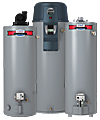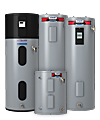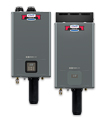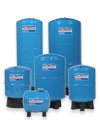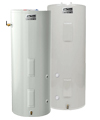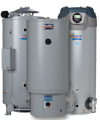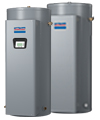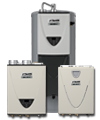DOE Minimum Efficiency Standards for
Residential Water Heaters
The Department of Energy’s (DOE) new energy conservation standards for residential water heaters will go into effect on May 6, 2029. These new regulations are part of DOE’s efforts to reduce overall energy consumption in the United States.
The Department of Energy (DOE) sets national minimum energy efficiency standards for Residential water heater and American Water Heaters is committed to leading our industry in compliance.
All water heater manufacturers will be required to meet new minimum efficiency standards for residential applications by May 6, 2029.
These new standards are expected to save American households approximately $7.6 billion per year on their energy and water bills, reduce fossil fuel usage, and move the US closer to its goal of net‑zero‑emissions.
Source: Energy.gov
Impacts of the New DOE Efficiency Standards
Everything You Need to Know
The new energy efficiency levels will be required for all residential water heaters produced on and after May 6, 2029. A.O Smith is here to make it easy.
What is changing?
- • Standards will require minor updates to gas-fired storage (gas tank) water heaters.
- • Electric storage (electric tank) water heaters with capacities greater than 35 gallons will require heat pump technology.
- • The gas instantaneous (gas tankless) product category has been excluded from this rule and will be addressed by the DOE in a subsequent rulemaking.
Gas Tank (Gas-fired Storage):
- • Capacities greater than 20 gallons: new standard to add Uniform Energy Factor (UEF) to these models – no current American products are impacted
- • Capacities between 20 and 55 gallons: incremental UEF increase – atmospheric gas units will require the addition of a damper
- • Capacities greater than 55 and less than or equal to 100 gallons: no change
- • Capacities greater than 100 gallons: new standard to add UEF to these models
Gas Tankless (Gas-fired Instantaneous):
Electric Tank (Electric Storage):
- • Capacities greater than 20 gallons: new standard to add UEF to these models – compact units
- • Capacities between 20 and 35 gallons: no UEF change, but will be limited to a max FHR of 50 gallons and a max temperature setting of 135°F
- • All nominal 40-gallon electric storage units that are currently rated at 36 or 37 gallons and will have to be reduced to 35 gallons
- • Capacities greater than 35 and less than or equal to 120 gallons: will require heat pump water heater technology
- • Capacities greater than 75 gallons which are grid-enabled: no changes are required
- • Capacities greater than 120 gallons: new standard to add UEF to these models – no current American products impacted
Electric Tankless (Electric Instantaneous):
- • Capacities greater than 2 gallons: no change
- • Capacities greater than or equal to 2 gallons: new standard to add UEF to these models – no current American products impacted
View ruling on Regulations.gov
View ruling on FederalRegister.gov
Rebates & Tax Credits
Rebate and incentive programs provide savings to consumers for the purchase of water heaters that meet certain energy efficiency standards.
Find Rebates and Tax Credits
Still Have Questions?
Why are the regulations changing for consumer (residential) water heaters?
Why are the regulations changing for consumer (residential) water heaters? The Energy Policy and Conservation Act, as amended (“EPCA”), prescribes energy conservation standards for various consumer products and certain commercial and industrial equipment, including consumer water heaters. EPCA also requires the U.S. Department of Energy (“DOE” or “the Department”) to periodically determine whether more stringent standards would be technologically feasible and economically justified, and would result in significant energy savings.
In this final rule, DOE is adopting amended energy conservation standards for consumer water heaters. It has determined that the new and amended energy conservation standards for these products would result in significant conservation of energy, and are technologically feasible and economically justified.
Source: https://www.regulations.gov/document/EERE-2017-BT-STD-0019-1426
I’ve heard these newer hybrid electric heat pump water heaters can be more expensive. Will I be able to afford one?
“The Inflation Reduction Act provides $8.8 billion for Home Energy Rebates to help eligible Americans save energy and save money through home improvements.*”
*Source: https://www.energy.gov/scep/homeowner-and-renter-resources
Homeowner and Renter Resources
Learn more about Home Efficiency Rebates (HOMES)
Recommended when:
- • You are taking a comprehensive set of actions to reduce your energy usage
- • All households are potentially eligible, with the largest rebates going to those with lower incomes
- • You can save up to $8,000 depending on your household income and project’s energy savings
- • our project will need to reduce your home's energy usage by at least 20% Learn more about Home Electrification and Appliance Rebates (HEAR)
Recommended when:
- • You are upgrading equipment and appliances in your home
- • Your household income is close to or below the average in your area
- • Provides households with up to $14,000 in rebates
- • Covers up to 100% of costs for lower income families and up to 50% for moderate-income families
- • The Federal Government, your state, and your utility company may offer tax credits and rebates — you can save up to $1,750 for an ENERGY STAR® Certified electric heat pump water heater.
Search for incentives in your area.
Learn about the DOE's Weatherization Assistance Program
What are the benefits of Hybrid Electric Heat Pump Water Heaters?
What do these changes mean for me?
If you are considering buying or replacing a water heater or thinking about a new home in the next few years, the new energy efficiency standards may impact your decision.
How soon will these changes affect me (as a homeowner or renter)?
The new energy efficiency standards for residential water heaters do not go into effect until May 6, 2029.
